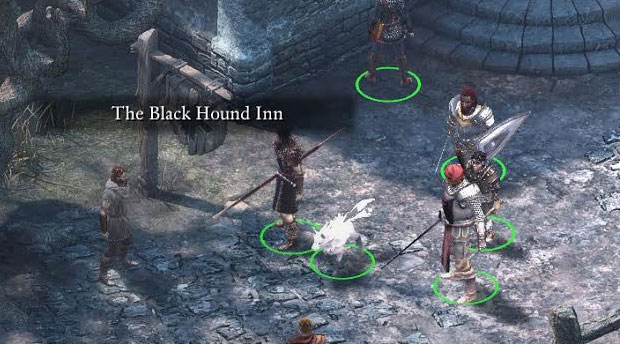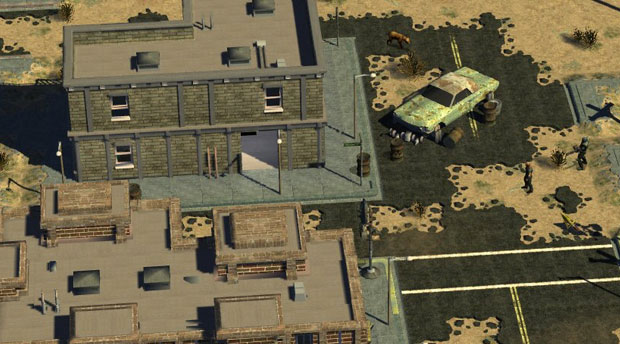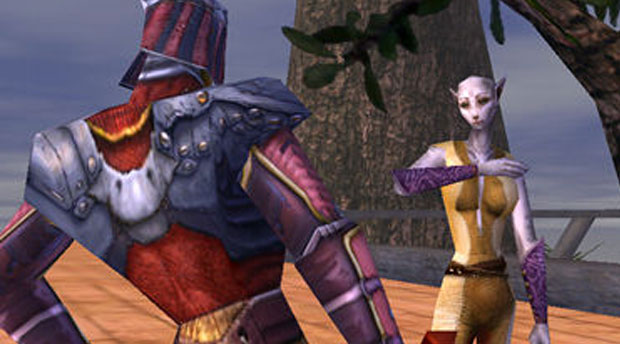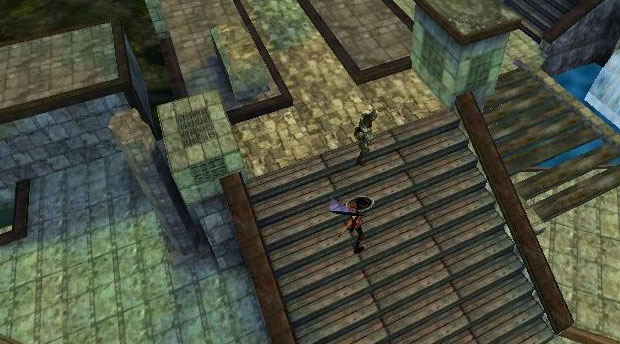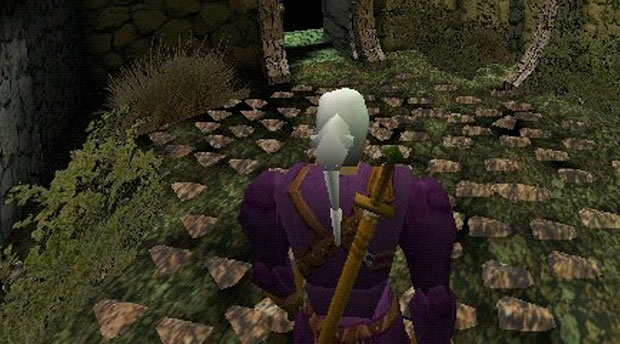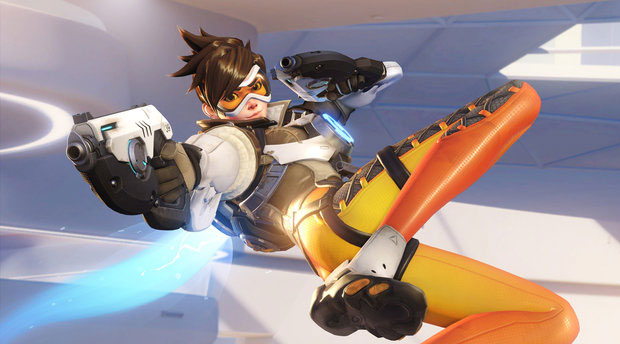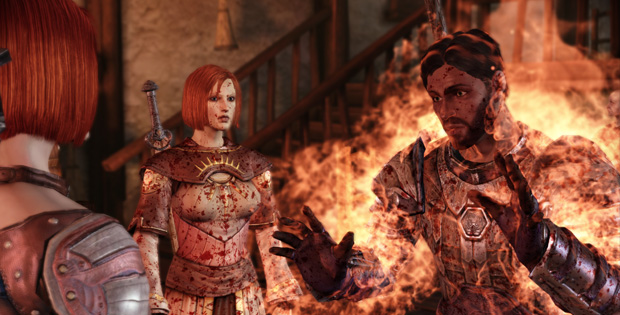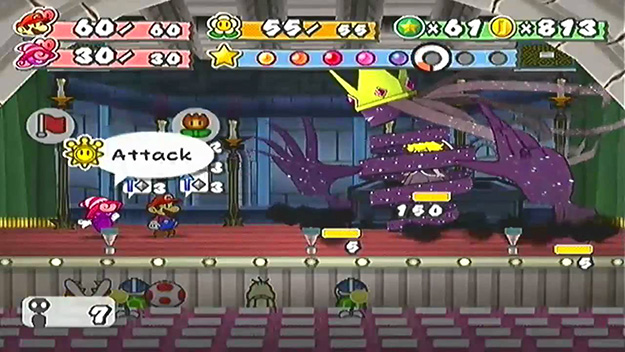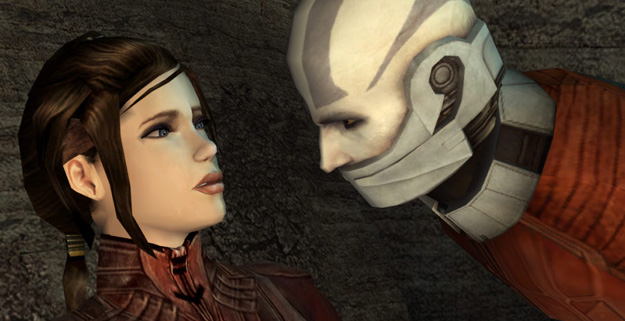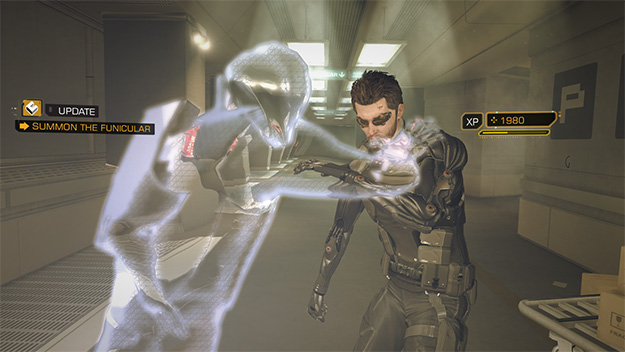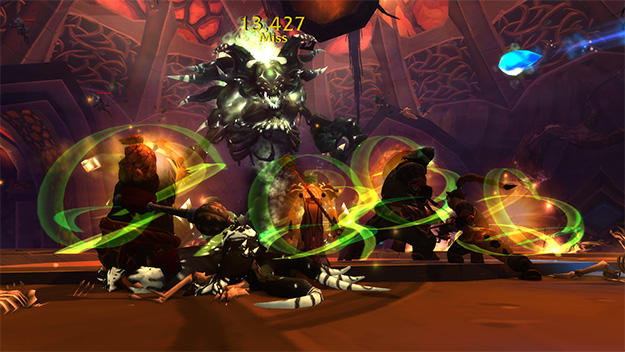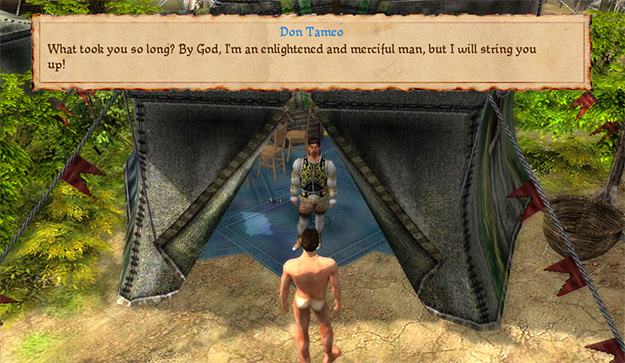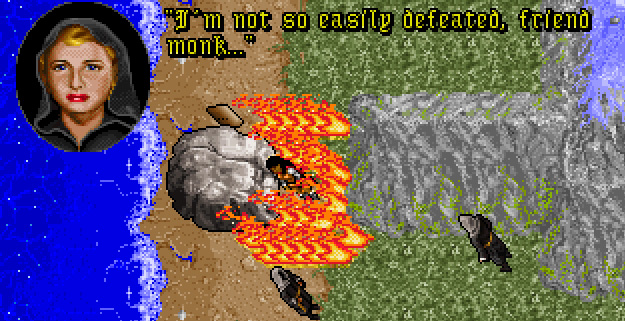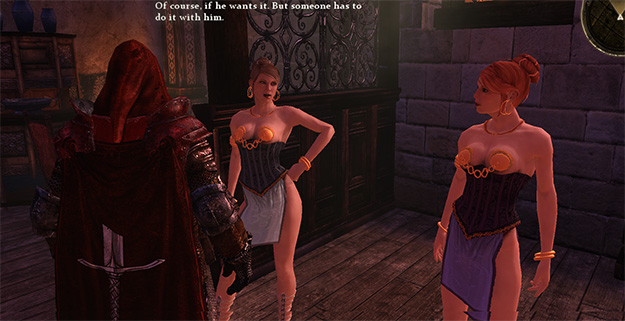Now that PC Gamer has let him go, Richard Cobbett (aka, imho, the only decent adventure game & RPG journalist) has a new weekly RPG column over at RPS, yay. Here's his first article, on length in RPGs:
http://www.rockpapershotgun.com/2015/04/06/the-rpg-scrollbars-how-long-is-too-long/
The RPG Scrollbars: How Long Is Too Long?
http://www.rockpapershotgun.com/2015/04/06/the-rpg-scrollbars-how-long-is-too-long/
The RPG Scrollbars: How Long Is Too Long?
Please welcome Richard Cobbett to our roster of weekly columnists. Every Monday at 1pm, Richard will be donning his +8 cap of writing to present a ragbag of news and reflections on role-playing games.
It’s been a great year for epic, old-school RPGs. A good tax-year anyway, since that conveniently scopes in everything from Divinity: Original Sin to Wasteland 2 to the other week’s Pillars of Eternity, to say nothing of several smaller titles. As we all know, part of the joy of a good RPG is slipping into a world – when everything works out, the long playtime feels like an epic journey rather than a commitment. Or at least it should. In the wake of The Witcher 3 promising 200 hours or so to see everything it’s got though, I’ve been thinking – at what point do the scales start to tip?
Now, to be fair this is at least in part because when these games’ originators came out, I was in a very different position. As a kid/teenager/delete as appropriate, new games didn’t come along very often, and value for money was key. With this round, I was reviewing most of them (typically over at neighbouring Eurogamer). That meant having to condense the whole games into just a few days, pounding and pounding away at them to see as much as possible and condense the experience into about 1000-2000 words. No matter how good a game is, it’s hard to approach a deadline with a game that’s still happily throwing in plot-twists instead of a final boss, blearily look at a clock about to tick 4AM, and not on some deep inward level find yourself screaming “END! END! EEEEEEND!”
In general though, people seem to find it increasingly hard these days to settle in for the kind of experiences of old. Instead, the games that really reward that tend to be the ones played in short sessions over long periods of time – the Dotas, the Minecrafts, the Spelunkies, where the addiction creeps up on you rather than presenting itself up front. With an epic RPG, the challenge isn’t simply beating up whatever threat is conquering some country that probably has too many vowels in its name, but remaining invested while outside distractions come thick and fast – new games, new seasons of Game of Thrones, boring work and variably boring social commitments. It’s so much easier to put aside an hour here and there, even if that hour ends up being two or three in practice, than straight-up putting aside 50 hours in a month to fully enjoy your latest adventure.
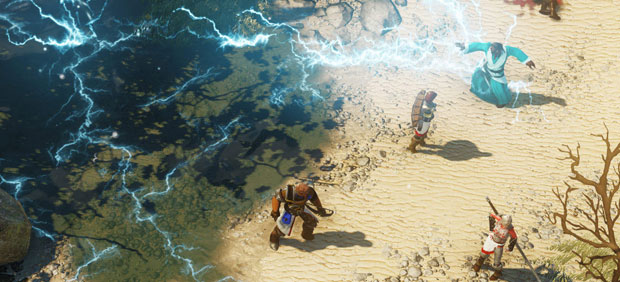
The result is that it’s hard to imagine most people – and I’m not talking about the hardcore RPG community here, but the wider market of people who enjoy these games – getting close to finishing them. Check the Steam Achievements for Divinity: Original Sin for instance and you’ll see that 56.5% of Steam players get the first achievement, relatively early on in the game, while just 5.4% have collected the coveted Lipsticked Lady of Game Completion. As ever, these aren’t an exact science – achievements often don’t trigger, players will have bought it and not played it, or quit after creating a character or similar, but still, they’re usually interesting reading.
Don’t mistake this as an argument against length. An RPG that doesn’t feel like it’s presenting a world, or a universe in the case of the science fiction ones, really isn’t doing its job. In a game like Skyrim, part of the joy is knowing that you’re never, ever going to see everything it has to offer – that you can stride out in any direction and find adventure. In Dragon Age Inquisition, while mechanically it’s simpler than I’d have liked, the story of the rise of the Inquisition wouldn’t have worked if it took less time than watching the intro of Might and Magic X. No, wait. Bad example. Some intro that isn’t seventeen freaking hours long and still fails to actually set up the story properly.
In the case of a linear RPG though, I’m finding that really large numbers are often a turn-off. It’s one thing to fire up a game that you know you’re going to love, like The Witcher 3 is currently looking set to be. When it’s a new world though, with unfamiliar mechanics, a team without solid credentials and a mass of new lore to learn, I tend to get a bit irritable. If you want 50 hours of my time, then you had better goddamn prove yourself worthy of them early on. An RPG for instance that begins with that hoary old intro “Chapter 1: Get To The Town Where The Game Actually Starts” has a pretty good chance of being dropkicked back into the internet pretty quickly. One that starts with reams of bullshit lore instead of actual story – and there is a difference – is one that I find hard to assume will suddenly realise it needs trivial things like character motivation and pacing and drama.
(Developers! Do you want to make me despair of your game from the very first frame? I’ll share the secret. Your intro should begin in a tower, with a dusty old tome with your logo on it opening, while some ponderous narrator spends ten minutes explaining what I can sum up in exactly two words: “Dragons exist.” For the love of Christ, play classic RPGs like Ultima VI to see how an RPG can start – drama! Excitement! Mystery! Danger! Focus! Brevity! There is plenty of time to explain why your elves are totally unlike everyone else’s elves later on. Much, much later. Quietly.)
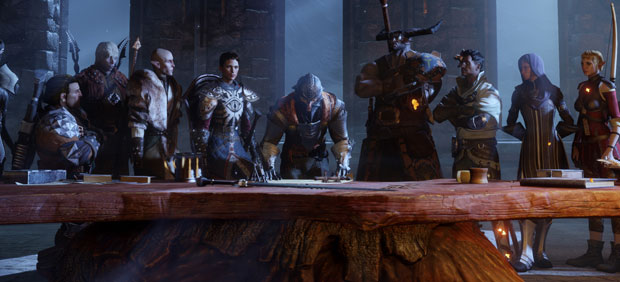
Rating in terms of hours also tends to, perhaps unfairly, make me question the content of those hours. Now, I’m not accusing Witcher 3 of this, not least because the ‘200 hours’ being splashed around was the reply to a Twitter question about doing everything in its open world rather than a straight-up “Buy our game, it’s huge!” affair. In general though, the larger a number, the more I start thinking of filler. Assassin’s Creed style ‘collect 500 things, because… they’re there.’ Dungeons that exist to pad out the running time with generic textures and packs of inexplicable monsters. Final Fantasy games, their middle acts especially in service of player time expectations rather than the needs of the story, which since and including Final Fantasy VII would always have been greatly improved by being sliced to ribbons with a machete. If there’s an exciting hour-based number, it comes after the game comes out – people choosing to put over 200 hours into, say, Skyrim as a mark of how much it gave them, rather than a promise of how much it theoretically might.
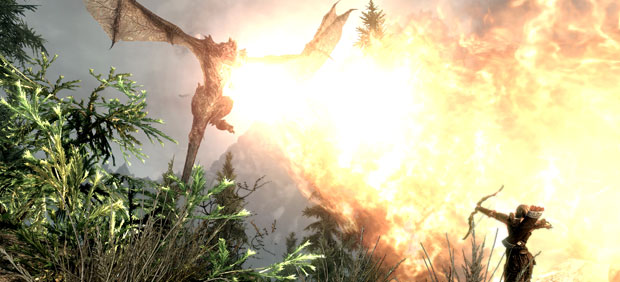
So with that being said, a question! How many hours play do you like to get from your first play of an RPG? I’m not thinking in terms of how much a company has to promise, but what you consider a worthy purchase that you’re still likely to actually get from it without being called away or distracted or simply burned out on the mechanics? A hundred hours? Fifty? Twenty? Months of play?
For me, these days, I find that around 20 hours in I’m usually looking forward to the ending and to be ‘free’ from the main quest, with itchy feet really kicking in at the 30 hour mark. There are exceptions of course, and that doesn’t mean I won’t go back after the main quest for challenges like Pillars of Eternity’s Eternal Paths, picking up fun sidequests, completing DLC or other things. I find it liberating though to know that I can walk away at any point without having wasted the time already invested – that even if the ending sucked, I saw it, and can mark down another world as saved.
That being said, I suspect I’ll be spending a good more time than that with The Witcher 3 when it comes out, and absolutely can’t wait. If you’re still concerned about the promised hours though, for better or worse, fear not. I called my people and they provided me with this complete chart of how long most people are expected to take finishing the game. No, it’s okay. All part of the service.
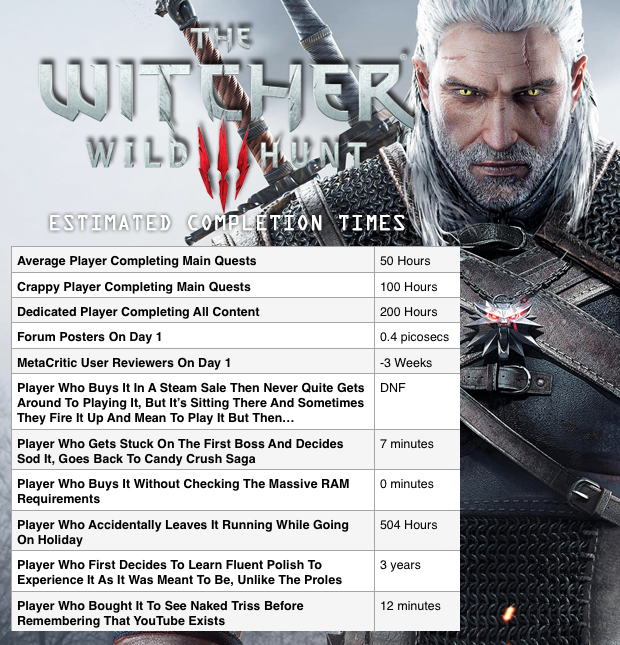
It’s been a great year for epic, old-school RPGs. A good tax-year anyway, since that conveniently scopes in everything from Divinity: Original Sin to Wasteland 2 to the other week’s Pillars of Eternity, to say nothing of several smaller titles. As we all know, part of the joy of a good RPG is slipping into a world – when everything works out, the long playtime feels like an epic journey rather than a commitment. Or at least it should. In the wake of The Witcher 3 promising 200 hours or so to see everything it’s got though, I’ve been thinking – at what point do the scales start to tip?
Now, to be fair this is at least in part because when these games’ originators came out, I was in a very different position. As a kid/teenager/delete as appropriate, new games didn’t come along very often, and value for money was key. With this round, I was reviewing most of them (typically over at neighbouring Eurogamer). That meant having to condense the whole games into just a few days, pounding and pounding away at them to see as much as possible and condense the experience into about 1000-2000 words. No matter how good a game is, it’s hard to approach a deadline with a game that’s still happily throwing in plot-twists instead of a final boss, blearily look at a clock about to tick 4AM, and not on some deep inward level find yourself screaming “END! END! EEEEEEND!”
In general though, people seem to find it increasingly hard these days to settle in for the kind of experiences of old. Instead, the games that really reward that tend to be the ones played in short sessions over long periods of time – the Dotas, the Minecrafts, the Spelunkies, where the addiction creeps up on you rather than presenting itself up front. With an epic RPG, the challenge isn’t simply beating up whatever threat is conquering some country that probably has too many vowels in its name, but remaining invested while outside distractions come thick and fast – new games, new seasons of Game of Thrones, boring work and variably boring social commitments. It’s so much easier to put aside an hour here and there, even if that hour ends up being two or three in practice, than straight-up putting aside 50 hours in a month to fully enjoy your latest adventure.

The result is that it’s hard to imagine most people – and I’m not talking about the hardcore RPG community here, but the wider market of people who enjoy these games – getting close to finishing them. Check the Steam Achievements for Divinity: Original Sin for instance and you’ll see that 56.5% of Steam players get the first achievement, relatively early on in the game, while just 5.4% have collected the coveted Lipsticked Lady of Game Completion. As ever, these aren’t an exact science – achievements often don’t trigger, players will have bought it and not played it, or quit after creating a character or similar, but still, they’re usually interesting reading.
Don’t mistake this as an argument against length. An RPG that doesn’t feel like it’s presenting a world, or a universe in the case of the science fiction ones, really isn’t doing its job. In a game like Skyrim, part of the joy is knowing that you’re never, ever going to see everything it has to offer – that you can stride out in any direction and find adventure. In Dragon Age Inquisition, while mechanically it’s simpler than I’d have liked, the story of the rise of the Inquisition wouldn’t have worked if it took less time than watching the intro of Might and Magic X. No, wait. Bad example. Some intro that isn’t seventeen freaking hours long and still fails to actually set up the story properly.
In the case of a linear RPG though, I’m finding that really large numbers are often a turn-off. It’s one thing to fire up a game that you know you’re going to love, like The Witcher 3 is currently looking set to be. When it’s a new world though, with unfamiliar mechanics, a team without solid credentials and a mass of new lore to learn, I tend to get a bit irritable. If you want 50 hours of my time, then you had better goddamn prove yourself worthy of them early on. An RPG for instance that begins with that hoary old intro “Chapter 1: Get To The Town Where The Game Actually Starts” has a pretty good chance of being dropkicked back into the internet pretty quickly. One that starts with reams of bullshit lore instead of actual story – and there is a difference – is one that I find hard to assume will suddenly realise it needs trivial things like character motivation and pacing and drama.
(Developers! Do you want to make me despair of your game from the very first frame? I’ll share the secret. Your intro should begin in a tower, with a dusty old tome with your logo on it opening, while some ponderous narrator spends ten minutes explaining what I can sum up in exactly two words: “Dragons exist.” For the love of Christ, play classic RPGs like Ultima VI to see how an RPG can start – drama! Excitement! Mystery! Danger! Focus! Brevity! There is plenty of time to explain why your elves are totally unlike everyone else’s elves later on. Much, much later. Quietly.)

Rating in terms of hours also tends to, perhaps unfairly, make me question the content of those hours. Now, I’m not accusing Witcher 3 of this, not least because the ‘200 hours’ being splashed around was the reply to a Twitter question about doing everything in its open world rather than a straight-up “Buy our game, it’s huge!” affair. In general though, the larger a number, the more I start thinking of filler. Assassin’s Creed style ‘collect 500 things, because… they’re there.’ Dungeons that exist to pad out the running time with generic textures and packs of inexplicable monsters. Final Fantasy games, their middle acts especially in service of player time expectations rather than the needs of the story, which since and including Final Fantasy VII would always have been greatly improved by being sliced to ribbons with a machete. If there’s an exciting hour-based number, it comes after the game comes out – people choosing to put over 200 hours into, say, Skyrim as a mark of how much it gave them, rather than a promise of how much it theoretically might.

So with that being said, a question! How many hours play do you like to get from your first play of an RPG? I’m not thinking in terms of how much a company has to promise, but what you consider a worthy purchase that you’re still likely to actually get from it without being called away or distracted or simply burned out on the mechanics? A hundred hours? Fifty? Twenty? Months of play?
For me, these days, I find that around 20 hours in I’m usually looking forward to the ending and to be ‘free’ from the main quest, with itchy feet really kicking in at the 30 hour mark. There are exceptions of course, and that doesn’t mean I won’t go back after the main quest for challenges like Pillars of Eternity’s Eternal Paths, picking up fun sidequests, completing DLC or other things. I find it liberating though to know that I can walk away at any point without having wasted the time already invested – that even if the ending sucked, I saw it, and can mark down another world as saved.
That being said, I suspect I’ll be spending a good more time than that with The Witcher 3 when it comes out, and absolutely can’t wait. If you’re still concerned about the promised hours though, for better or worse, fear not. I called my people and they provided me with this complete chart of how long most people are expected to take finishing the game. No, it’s okay. All part of the service.








![Have Many Potato [2013] Codex 2013](/forums/smiles/campaign_tags/campaign_potato2013.png)
![The Year of Incline [2014] Codex 2014](/forums/smiles/campaign_tags/campaign_incline2014.png)




















![Glory to Codexia! [2012] Codex 2012](/forums/smiles/campaign_tags/campaign_slushfund2012.png)








